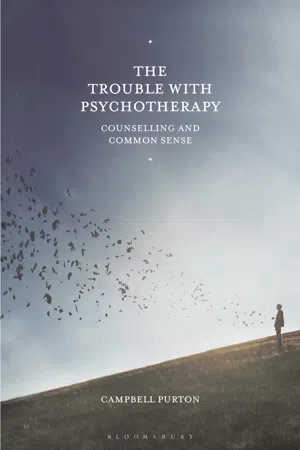
- 240 pages
- English
- PDF
- Available on iOS & Android
About this book
Current therapeutic practice is grounded in traditional theories of psychotherapy, such as the theories that underlie cognitive-behavioural, psychodynamic and person-centred practice. But none of these approaches has been proven to be more effective than any other, leaving the therapist with an ethical and professional dilemma: how do you advocate and practise one theory with your clients, when a completely different theoretical approach is being successfully practised down the road? In this book Campbell Purton argues that psychotherapy and counselling theories fail to provide adequate justification for their practice. Part 1 highlights the weaknesses and dangers that underlie traditional counselling theories and their derivatives, including psychodynamic, cognitive behavioural, existential and neuroscience approaches. Having unpicked these theories, Part 2 goes on to develop an exciting new way of thinking about therapy that does not rely on theory - one that can be likened to a 'common sense' approach to therapeutic practice. This book poses important questions and offers unique insight for anyone studying or practising in the field of counselling and psychotherapy.
Frequently asked questions
- Essential is ideal for learners and professionals who enjoy exploring a wide range of subjects. Access the Essential Library with 800,000+ trusted titles and best-sellers across business, personal growth, and the humanities. Includes unlimited reading time and Standard Read Aloud voice.
- Complete: Perfect for advanced learners and researchers needing full, unrestricted access. Unlock 1.4M+ books across hundreds of subjects, including academic and specialized titles. The Complete Plan also includes advanced features like Premium Read Aloud and Research Assistant.
Please note we cannot support devices running on iOS 13 and Android 7 or earlier. Learn more about using the app.
Information
Table of contents
- Cover
- Half-Title
- Title
- Copyright
- Dedication
- Series
- Contents
- Acknowledgements
- Introduction
- The origins of the book
- Part I The Trouble
- Part II Starting Again
- References
- Index